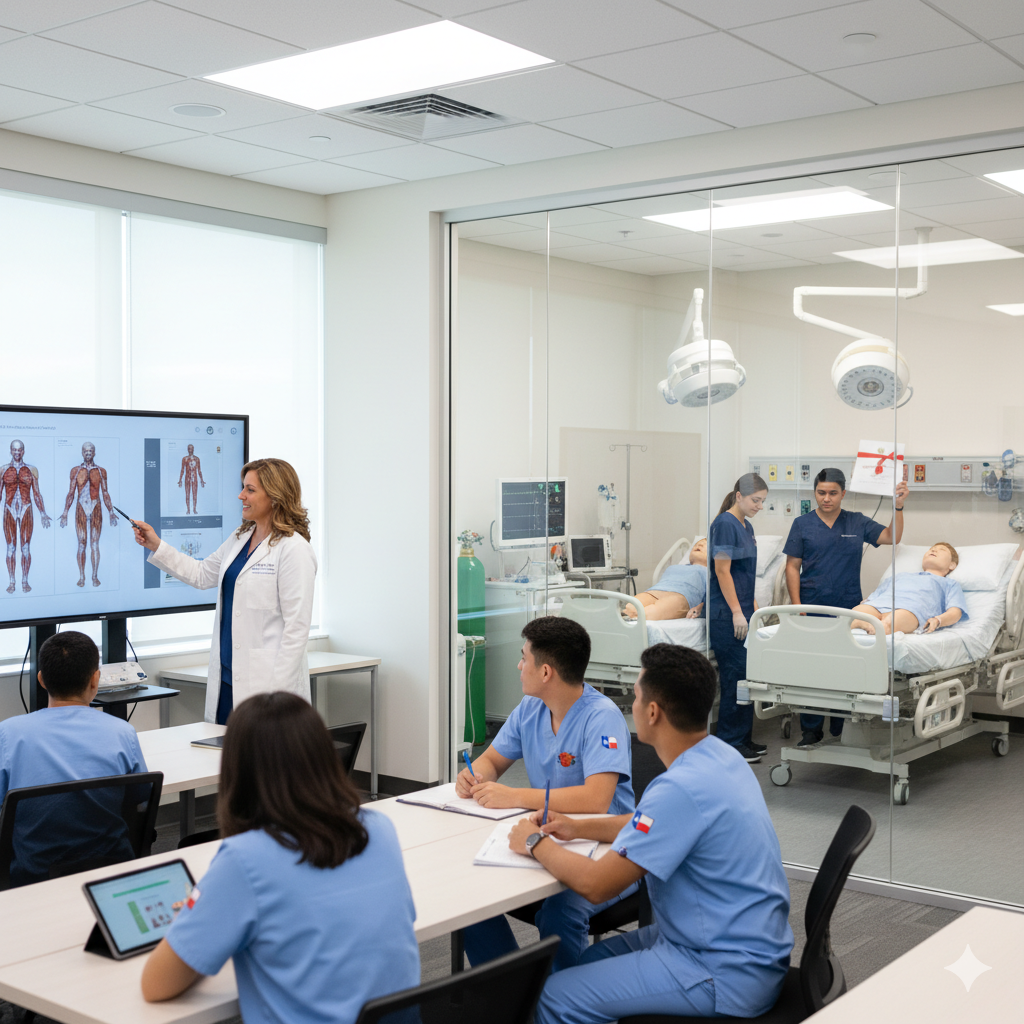Healthcare is one of the fastest-growing industries in Texas, and the demand for qualified professionals continues to rise. With a booming population, advancements in medical technology, and an aging workforce, the future of healthcare jobs in Texas looks promising. For students, career changers, and professionals seeking growth, understanding the trends shaping the healthcare workforce in 2025 and beyond is essential.
At Solomon’s Healthcare Academy (SHA), we focus on preparing students with the knowledge, skills, and certifications needed to thrive in this evolving industry. Let’s explore the key healthcare career trends, job growth areas, and opportunities that await in the Lone Star State.
Why Texas is a Healthcare Career Hotspot
Texas ranks among the top states for healthcare employment due to several factors:
Population Growth: Texas is one of the fastest-growing states in the U.S., with millions of new residents expected by 2030. This fuels demand for healthcare services across hospitals, clinics, and community centers.
Aging Demographics: An increasing elderly population means higher demand for nursing, home healthcare, and specialized medical services.
Medical Innovation: Texas is home to world-class medical centers such as the Texas Medical Center in Houston, fostering research and advanced care.
Diverse Healthcare Needs: From rural towns to metropolitan hubs like Dallas, Austin, and San Antonio, Texas offers career opportunities across various settings.
For anyone considering a career in healthcare, Texas is not just a good option—it’s a future-proof investment.
Top Healthcare Job Trends in Texas for 2025 and Beyond
1. Registered Nurses (RNs) – Still the Backbone of Healthcare
Registered Nurses remain the most in-demand professionals in Texas. According to workforce studies, the state will face a shortage of nearly 60,000 nurses by 2032 if current trends continue.
Why this matters:
Hospitals and clinics are actively hiring nurses.
Specializations like critical care, pediatric nursing, and geriatric care are particularly valuable.
NIOS pathways and certification courses at SHA help prepare students for these career demands.
2. Allied Health Professionals – The Hidden Heroes
Roles such as Patient Care Technicians (PCTs), Medical Assistants, and Emergency Medical Technicians are rapidly growing. These professionals support doctors and nurses, ensuring smooth patient care delivery.
Future Outlook:
- Patient Care Technicians are in high demand due to their versatile skills in both clinical and administrative support.
Healthcare systems increasingly rely on allied health staff to bridge gaps in patient care.
At SHA, our PCT programs are designed to help students enter this rewarding and fast-growing career path.
3. Growth in Preventive and Community Health Roles
Healthcare is shifting toward prevention rather than treatment. This means more jobs in:
Public health programs
Community outreach
Preventive care education
Texas healthcare providers are focusing on rural outreach, chronic disease management, and wellness programs, creating a surge in roles for community health workers and educators.
4. Demand for Certified Training in Life-Saving Skills
With emergencies on the rise, certifications in BLS (Basic Life Support), ACLS (Advanced Cardiovascular Life Support), and CPR & First Aid are becoming mandatory in many roles.
Trend Insight:
Employers in Texas increasingly require candidates to have up-to-date life-saving certifications before hiring. Solomon’s Healthcare Academy offers these certification programs, ensuring students are job-ready.
5. Technology-Driven Careers – Telehealth and Digital Healthcare
The pandemic accelerated telehealth adoption, and it’s here to stay. Texas patients are now receiving care via digital platforms, which means new job roles in:
Telehealth nursing
Health informatics
Virtual patient support
Healthcare professionals trained in technology-enabled care will be in high demand.
6. Specialized Fields – Cardiac, Emergency, and Critical Care
With lifestyle diseases on the rise, specialized areas such as cardiology, emergency response, and critical care are seeing consistent growth. This creates demand for ACLS-certified professionals and technicians who can handle life-threatening emergencies.
7. Flexible Career Pathways and Upskilling
The future of healthcare in Texas emphasizes continuous learning and certification updates. Professionals who invest in additional certifications will have better career mobility.
At SHA:
Students can pursue step-by-step certifications.
Career pathways are built to move from entry-level roles to advanced specializations.
Upskilling ensures competitiveness in a crowded job market.
The Role of Education in Shaping Healthcare Careers
Education is the foundation of a successful healthcare career. Institutions like Solomon’s Healthcare Academy in Texas are bridging the gap between workforce demand and skill availability.
What Makes SHA Different?
Hands-On Training: Real-world simulations to build confidence.
Accredited Courses: Recognized programs in BLS, ACLS, PCT, NCLEX prep, and more.
Career Support: Guidance in job placement and interview readiness.
Flexible Schedules: Programs designed for working adults and full-time students.
By focusing on industry-aligned training, SHA ensures students are not just certified but also fully prepared for their roles.
Healthcare Jobs with the Highest Growth Potential in Texas
Here’s a quick look at future-proof healthcare careers in Texas (2025 and beyond):
Registered Nurses (RNs) – Hospitals, clinics, home health
Patient Care Technicians (PCTs) – Entry-level clinical support
Medical Assistants – Clinical + administrative support
Certified Nursing Assistants (CNAs) – Direct patient care
Emergency Medical Technicians (EMTs) – Pre-hospital care
Pharmacy Technicians – Medication dispensing and support
Public Health Workers – Preventive and community outreach
Telehealth Support Specialists – Digital healthcare delivery
These careers not only offer stability but also competitive salaries and opportunities for advancement.
The Future Outlook: Texas Healthcare in 2030 and Beyond
Looking ahead, Texas healthcare will be defined by:
Innovation in medical technology (AI-driven diagnostics, robotics in surgery).
Increased demand for holistic care (mental health, wellness, lifestyle coaching).
Rural healthcare development to bridge accessibility gaps.
Greater emphasis on certifications to ensure safety and compliance.
This means today’s students and professionals must remain adaptable, skilled, and certified.
How Solomon’s Healthcare Academy Prepares You for the Future
At SHA, we understand the evolving needs of the healthcare workforce. Our mission is to empower students with practical knowledge and recognized certifications so they can build rewarding careers.
BLS & ACLS Certification Courses: Equipping you with life-saving skills.
Patient Care Technician (PCT) Program: Training for one of Texas’s fastest-growing roles.
NCLEX Prep Courses: Helping nursing students achieve licensure success.
CPR & First Aid Classes: Essential for both healthcare workers and community responders.
By choosing SHA, students gain access to career pathways that align with the future of healthcare jobs in Texas.
Final Thoughts
The healthcare industry in Texas is entering a new era of opportunity. From nursing shortages to telehealth expansion, the future of healthcare jobs in Texas is filled with promise for those ready to step in. Whether you’re just beginning your journey or looking to upskill, the demand for certified professionals will only continue to grow.
At Solomon’s Healthcare Academy, we are committed to preparing students for these opportunities through hands-on training, accredited programs, and industry-focused education. The future of healthcare is bright—and it starts with the right preparation today.




